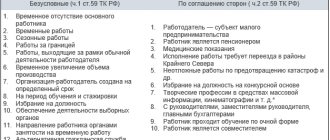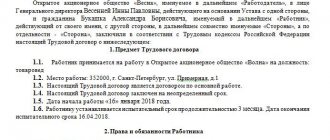An employer may enter into various types of employment contracts, depending on the specifics of the employment or the nature of the work. When choosing the type of contract, it is important to follow a number of rules so as not to come to the attention of labor or tax inspectors.
Types of employment contracts according to their duration are divided into open-ended - for an indefinite period, and fixed-term - for a certain period of not more than five years.
When to conclude which agreement?
According to general rules, an employment contract is concluded for an indefinite period. This type of document is suitable for all categories of persons, including minors, disabled people, and foreign citizens.
If the document cannot be concluded for an indefinite period, a fixed-term employment contract is drawn up, which describes the working conditions and other features of the relationship between the parties.
If there are no legal grounds for establishing the validity period of the contract, it may be declared illegal, and the organization may be required to enter into an open-ended employment contract. When choosing the type of contract according to the terms, you need to take into account that you cannot oblige the employee to sign a temporary employment contract - any contract is concluded by agreement of the parties.
A fixed-term employment contract is concluded under the following circumstances:
Circumstances under which this type of contract is mandatory, for example:
- to perform predetermined work;
- for sending abroad;
- during the replacement of an employee.
Circumstances under which the employer has the right to enter into this type of contract , for example:
- with part-time workers;
- with pensioners;
- with creative workers.
By agreement of the parties, employers have the right to conclude a fixed-term employment contract - small businesses (including individual entrepreneurs), the number of employees of which does not exceed 35 people, and in the field of retail trade and consumer services - 20 people.
Under a fixed-term employment contract, workers can be hired by companies, entrepreneurs, or individuals who do not have individual entrepreneur status. The term of a fixed-term employment contract does not exceed five years.
What needs to be included in a fixed-term employment contract
The unified form of the contract is not approved by law; the employer develops it independently.
The contract with the employee includes all important terms of the relationship.
Mandatory information that a fixed-term employment contract must contain:
- place of work;
- labor functions;
- work start date;
- contract time;
- grounds for concluding the contract;
- conditions determining the nature of the work;
- working conditions in the workplace;
- payment under a fixed-term employment contract;
- work and rest schedule;
- if the work is dangerous or harmful - guarantees and compensation;
- conditions of social insurance of the employee.
Additional conditions that should be included in the contract:
- duration and conditions of testing upon hiring;
- non-disclosure of trade secrets.
The employment contract is concluded in writing, in two copies. Each copy is personally signed by both parties, and each party must retain a copy of the agreement.
Vacation for a fixed-term employment contract
Working under a fixed-term employment contract, an employee has the right to annual paid leave of standard duration - 28 calendar days. For workers who work for a short period of time, for example, temporary, seasonal workers, the calculation of vacation has a number of features:
- if the employee worked for less than half a month, then leave is not granted for this month;
- if more than half a month has been worked, then two days of vacation are due for this month;
- if at the time of dismissal of the employee the vacation has not been spent, the employer pays him monetary compensation;
- It is possible to provide leave with subsequent dismissal.
Dangerous moments
Concluding fixed-term employment contracts instead of open-ended ones in order to evade providing employees with their rights and guarantees is directly prohibited by Article 58 of the Labor Code.
An employment contract concluded for a certain period in the absence of sufficient grounds established by the court is considered concluded for an indefinite period (Article 58 of the Labor Code of the Russian Federation).
If the court reclassifies employment contracts as open-ended, then in addition to all required payments to employees (reinstatement at work, payment for forced absence, moral damage, etc.), they will have to pay a fine (Article 5.27 of the Code of Administrative Offenses of the Russian Federation). Its amount for officials is 1000–5000 rubles, for legal entities – 30,000–50,000 rubles. Moreover, the court can suspend your activities for up to three months.
To prevent this from happening, you need to pay special attention to the correct and timely documentation of labor relations with employees, as well as proper registration. The document must contain all the necessary details: date, number, signature, etc. Let’s list a few key points.
If the court reclassifies employment contracts as open-ended, then in addition to all required payments to employees (reinstatement at work, payment for forced absence, moral damage, etc.), they will have to pay a fine (Article 5.27 of the Code of Administrative Offenses of the Russian Federation).
The contract must be concluded for a certain period. In the event of a trial, you will have to prove that the employment contract could not have been concluded for an indefinite period. This obligation of the employer is enshrined in Article 56 of the Civil Procedure Code. If you cannot prove this, then a fixed-term employment contract can be reclassified as an indefinite one. This is due to the fact that Article 59 of the Labor Code lists cases in which the employer has the right, and not the obligation, to enter into a fixed-term employment contract. He can exercise this right only by complying with all the requirements of Article 58 of the Labor Code.
You cannot conclude several fixed-term employment contracts in a row with the same employee to perform the same job function. If it is established that the same employee has repeatedly concluded short-term fixed-term employment contracts to perform the same job function, the court has the right to recognize the employment contract as indefinite (clause 14 of the resolution of the Plenum of the Supreme Court of the Russian Federation of March 17, 2004 No. 2).
A fixed-term employment contract concluded by agreement of the parties can also be recognized as indefinite. This will happen if the court decides that workers were forced to enter into fixed-term employment contracts.
Another dangerous point is the expiration of the employment contract. If a person continues to work and the employer does not require termination of the contract, then it is considered concluded for an indefinite period (Article 58 of the Labor Code of the Russian Federation). Therefore, you need to carefully monitor the expiration of employment contracts and formalize everything correctly.
Let's calculate vacation pay
A fixed-term employee has the same right to annual paid leave as an employee under an open-ended employment contract. Based on Article 114 of the Labor Code, he is generally granted annual paid leave while maintaining his job and salary. The duration of leave for “indefinite-term” employees should not be less than 28 calendar days per year (Article 115 of the Labor Code of the Russian Federation). If a person is signed under a fixed-term employment contract, vacation pay is calculated differently; the duration of his vacation directly depends on the number of days worked.
Thus, according to Article 295 of the Labor Code, employees who have entered into fixed-term employment contracts for a period of less than two months or perform seasonal work are granted leave in the amount of two working days for each month of work.
Employees who have entered into fixed-term employment contracts for a period of less than two months or perform seasonal work are granted leave in the amount of two working days for each month of work (Article 295 of the Labor Code of the Russian Federation).
Please note: the right to use vacation for the first year of work arises for an employee only after six months of continuous work with one employer (Article 122 of the Labor Code of the Russian Federation).
The amount of vacation pay for an employee registered under a fixed-term employment contract depends on the amount of his average salary. The rules for calculating average wages are uniform and are established in Article 139 of the Labor Code and in the Regulations on the specifics of the procedure for calculating average wages, approved by Decree of the Government of the Russian Federation of December 24, 2007 No. 922.
Regardless of the mode of work, the average salary is calculated based on the salary actually accrued to the employee and the time actually worked by him for the 12 calendar months preceding the period during which the employee retains the average salary. The calendar month for calculation is considered to be the period from the 1st to the 30th (31st) day of the corresponding month inclusive (clause 4 of the Regulations on the specifics of the procedure for calculating average wages).
The amount of average earnings is equal to the product of the average daily earnings by the number of days in the period subject to payment.
To calculate the average daily earnings for vacation pay in calendar days and payment of compensation for unused vacations, you need to divide the amount of wages actually accrued for the billing period by 12 and by the average monthly number of calendar days (29.4).
An employee can take leave at his own expense in the general manner on the basis of a written application (Article 128 of the Labor Code of the Russian Federation).
Often the vacation time extends beyond the term of the employment contract, and the employee is granted vacation with subsequent dismissal, then the employee’s last working day will be the last day of his vacation. At the same time, the employment contract is not recognized as indefinite, because the rule to consider the last vacation day as the day of dismissal is established by Article 127 of the Labor Code.
Example
A travel company entered into an employment contract for a period of six months with a swimming instructor Lastov with a salary of 30,000 rubles. per month. Lastov taught tourists to scuba dive six days a week from April 1 to September 30, 2010 inclusive. Let's calculate the amount of vacation pay for a seasonal employee.Lastov worked fully for six months, the duration of his vacation will be:
6 months x 2 days/month = 12 days
The amount of accrued wages will be:
30,000 rub./month. x 6 months = 180,000 rub.
The number of working days will be:
26 in April + 24 in May + 25 in June + 27 in July + 26 in August + 26 in September = 154 days.
Average daily earnings will be:
180,000 rub. : 154 days = 1168.83 rub./day.
The amount of vacation pay will be:
RUB 1,168.83/day x 12 days = 14,025.96 rub.
Fixed-term employment contract and work contract
Do not confuse a fixed-term employment contract with a contract ; they have significant differences for both parties - both the employer and the employee:
An employment contract concluded for a certain period is regulated by labor legislation, which guarantees the employee the receipt of all social guarantees, vacations, and sick leave. Relations under a contract are governed by civil law.
Under a fixed-term employment contract, the employee performs a permanent job function, while under a GPC agreement, the achievement of a specific result is important. Under a fixed-term employment contract, the employee receives payment for work on a regular basis at least twice a month, regardless of the achievement of certain results. Work under a fixed-term employment contract is the basis for entering information about work in the work book and is included in the length of service, when work under the GPA does not give such rights.
In some cases, employers prefer to enter into a fixed-term employment contract, but make mistakes that can lead to adverse consequences - fines, reclassification of the contract into an open-ended one, litigation with the employee.
NTVP "Kedr - Consultant"
LLC "NTVP "Kedr - Consultant" » Services » Legal consultations » Labor disputes » On the possibility of working under a civil contract during your vacation at the same place of work with the same employer
Question:
Is it possible to work under a civil contract during your vacation at the same place of work with the same employer?
Lawyer's answer
Concluding a civil law contract with an employee who is already working for the employer under an employment contract for the duration of his main paid leave does not contradict the legislation of the Russian Federation, provided that there are no signs of labor relations in these relations. For a position provided for in an employment contract, the conclusion of a civil contract is not allowed.
According to Part 1 of Art. 37 of the Constitution of the Russian Federation, everyone has the right to freely use their ability to work, choose their type of activity and profession.
Civil legislation establishes that citizens and legal entities are free to enter into an agreement (Article 421 of the Civil Code of the Russian Federation). By virtue of paragraph 1 of Art. 420 of the Civil Code of the Russian Federation, a contract is an agreement between two or more persons to establish, change or terminate civil rights and obligations.
From the foregoing it follows that a citizen has the right to freely enter into civil contracts and carry out work on their basis. That is, an employee of an organization during the main paid leave can freely dispose of knowledge, skills, abilities and enter into civil legal relations with his employer.
The legislation of the Russian Federation does not prohibit an employer and an employee from entering into civil legal relations, including if labor relations already exist between the above-mentioned persons.
At the same time, the labor legislation of the Russian Federation establishes that the conclusion of civil contracts that actually regulate labor relations between an employee and an employer is not allowed (Part 2 of Article 15 of the Labor Code of the Russian Federation). Otherwise, on the basis of Part 4 of Art. 5.27 of the Code of the Russian Federation on Administrative Offenses, for evasion or improper execution of an employment contract or the conclusion of a civil contract that actually regulates labor relations between an employee and an employer, the employer may be held administratively liable.
The Letter of the Ministry of Labor of Russia dated August 13, 2014 N 17-3/B-383 states that the legislation of the Russian Federation allows the employment of persons on the basis of civil law contracts only in cases where these contracts do not actually regulate labor relations between the employee and the employer, that is, individuals under a civil law contract perform other paid work not provided for by the employment contract.
Thus, when concluding a civil contract with a full-time employee, it is important that this contract does not contain features inherent exclusively in an employment contract, and the task assigned to the employee is not his labor function provided for by the employment contract.
From Art. 15 of the Labor Code of the Russian Federation it follows that labor relations are those based on an agreement between the employee and the employer on the personal performance by the employee for payment of a labor function (work according to the position in accordance with the staffing table, profession, specialty indicating qualifications; the specific type of work entrusted to the employee) in interests, under the management and control of the employer, the employee’s subordination to internal labor regulations while the employer provides working conditions provided for by labor legislation and other regulatory legal acts containing labor law norms, a collective agreement, agreements, local regulations, and an employment contract.
Taking into account the above, we can conclude that in a situation where an employer wishes to conclude a civil contract with an employee for the position provided for by his employment contract, when the nature and scope of work will be the same, the conclusion of a civil contract in this case is not allowed. If necessary, with an employee during his main paid leave, in case of mutual agreement, you can conclude a civil contract (on the performance of work, provision of services, contract agreement, etc.) for another position, but it should not contain the characteristics of an employment contract .
Recommendations for distinguishing between an employment contract and related civil law contracts are given in Letter of the Federal Social Insurance Fund of the Russian Federation dated May 20, 1997 N 051/160-97.
Thus, engaging a willing employee employed under an employment contract to work during leave under a civil law contract is not a violation of the labor legislation of the Russian Federation, provided that the performance of work (provision of services) does not coincide with the labor function provided for by the employment contract.
{Question: Can an employer enter into a civil contract with an employee in order to carry out work during the main paid leave for the same position or another? (Expert consultation, State Labor Inspectorate in the Nizhny Novgorod region, 2017) {ConsultantPlus}}
The explanation was given by Igor Borisovich Makshakov, legal consultant of LLC NTVP Kedr-Consultant, September 2019.
When preparing the answer, SPS ConsultantPlus was used.
This consultation has passed quality control:
Reviewer - Candidate of Legal Sciences, Associate Professor of the Department of Labor Law and Fundamentals of Law of the ISUB Udmurt State University, Honored Lawyer of the Udmurt Republic, Sobolev Sergey Anatolyevich






